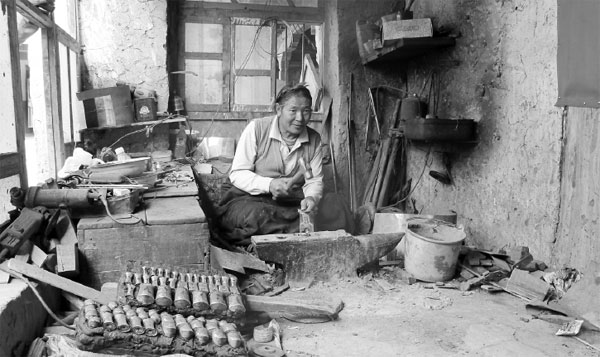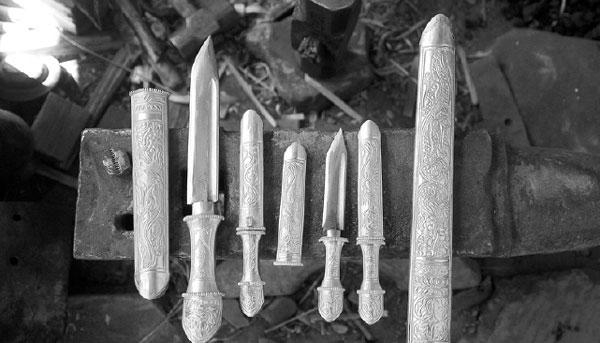Ancient tradition of making knives still survives
Updated: 2014-10-02 07:33
By Phuntsog Tashi and Palden Nyima(China Daily USA)
|
|||||||||
In a county, a few skilled men are trying to keep the craft alive, with the government's help. Palden Nyima and Phuntsog Tashi report in Tibet autonomous region.
In the quiet Lhaze county at the Tibet autonomous region, the sound of constant hammering draws the attention of passers-by to a house, where a man is busy making knives.
Budawa, 57, the house's owner, has been involved with the business since the past 45 years, and is today considered among the few remaining makers of the Tibetan knife.
|
Budawa is making a sheath at his workshop. He was accredited as the "representative inheritor" of Lhaze Tibetan knife making by an intangible cultural heritage project in the Tibet autonomous region in 2008. Palden Nyima / China Daily |
|
Tibetan knives made by Budawa in 2011. These knives go through some 12 stages of production before they are ready to be sold. Xu Yu / Xinhua |
The county has produced generations of such men, making it a specialty of the region, but the tradition is somewhat fading.
Budawa, who goes by the lone name, learned to make knives from his uncle Dorje Gyalpo, a fifth generation inheritor of the skill, at the age of 13.
"My uncle was the knife maker for the 10th Panchan Lama in Tashilhunpo Monastery in the 1980s, and I was with him at the time," said Budawa.
Local residents point out that their knife-making history also finds mention in Tibetan school textbooks.
"The 10th Panchan Lama came to my home and reminded me not to lose this ancient tradition, and his words have become a driving force for me," added Budawa.
He is particularly concerned that the craft may become extinct one day because it is a knowledge that is passed on to only male members of blood relations of the original families that made the knives.
Budawa also said that people frown upon his line of work. But he worries less about it these days as his 28-year-old son, Dorje Dradul, has become proficient in the craft.
"The work is time consuming and I sometimes get bored. But I will stick to passing this tradition on, and I feel proud to be my father's successor," said Dorje Dradul.
Additionally, Budawa has been teaching knife-making techniques to other younger people. Three of his seven trainees have already taken up the job independently. Local authorities support the indigenous industry but demand has outstripped supply.
"Most of the buyers of my knives are Tibetan people from the region. But there are many outsiders and tourists who buy them as well," he said.
The knife he produces is enriched with some Tibetan traditional designs. The sheath, for instance, is decorated with engravings of the dragon, phoenix, Qomolangma (Mount Everest), and hand carved words like "Tibet" and "Lhaze Tibetan Knife".
The reason behind the exclusive Tibetan designs is fueled by his worry that the designs may be lost.
"The history of Tibetan knife making has lasted for six generations. During the Gyangze's anti-British war in 1904, the knives produced in Lhaze were used as best weapons," he said.
The Tibetan knife goes through some 12 stages of production, including making the sheath, welding, forging the blade, sharpening, engraving designs and polishing, before it is ready to be sold.
Making a few 60-cm-long small-sized knives could take up to two weeks.
It takes at least four years of learning to master the skill.
He made about 120,000 yuan ($19.452) from his trade last year, and his average annual income is around 80,000 yuan.
Tibetan knives are mainly used for household purposes, self-protection and as a decoration on traditional Tibetan clothing, local residents said.
In 2008, Budawa was accredited as the "representative inheritor" of Lhaze Tibetan knife making by a regional level intangible cultural heritage project.
"I am pleased that the government stresses on my work, and I believe Lhaze Tibetan knife craft will continue to shine," he said.
Contact the writers through palden_nyima@chinadaily.com.cn
(China Daily USA 10/02/2014 page5)
Most Viewed
Editor's Picks

|

|

|

|

|

|
Today's Top News
At least 3 Chinese tourists killed in S. Africa traffic accident
China, US diplomats seek new type of relations
EU says Ireland swapped Apple tax deal for jobs
Netflix to release 'Crouching Tiger' sequel
Chow Tai Fook will remain focused on China
US Secret Service director resigns
Chinese mainland is Hong Kong's future: the Guardian
Up to 18 exposed to US Ebola patient, including children
US Weekly

|

|


















